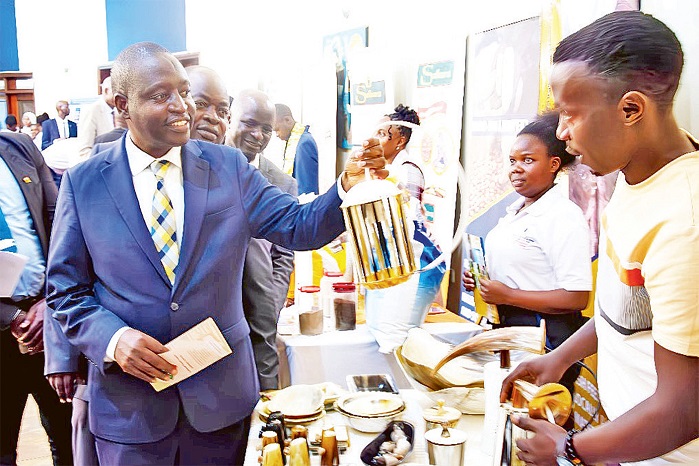
Bahati (left) inspects some of the locally made products during the World Accreditation Day celebrations in Kampala last week
HABARI DAILY I Kampala, Uganda I David Bahati, the State Minister for Industry has said that accreditation can open doors for Uganda’s businesses and protect the health of its people.
“Accreditation gives businesses confidence in the quality of testing and certification, which reduces risks and helps products meet international standards,” he said during the World Accreditation Day celebrations, which were held at Imperial Royale Hotel in Kampala last week.
He further pointed out that accreditation also minimises risks for business as decisions will be based on reliable results.
“Once we embrace accreditation, the rejection statistics of our products in the export markets will reduce from $700 million to $100 million by 2030,” said Bahati.
He further noted that accreditation would help Ugandan firms expand into regional and global markets.
“Uganda currently exports about $9.4b worth of goods a year, but this figure could rise if testing and certification systems were locally recognised. If well embraced, accreditation will facilitate the free trade goal of access to international markets for our products,” he said.
He urged local manufacturers to embrace the regional market, where the East African Community has a population of about 343 million people, Common Market for Eastern and Southern Africa has 640 million people, and the African Continental Free Trade Area that unites 54 countries has a combined gross domestic product of $3.4 trillion.
The minister cited the 2022 World Cup in Qatar, where Ugandan beef was rejected because the country lacked accredited halal certification.
Uganda now has about 90 accredited laboratories, up from just seven in 2015. These include two animal health labs accredited under the one-health approach.
Dr Charles Olaro, the Director-general of health services in the health ministry linked accreditation to Uganda’s wider economic ambitions, arguing that stronger laboratory systems will support both public health and trade under the Government’s strategy to grow the economy to $500 billion.




